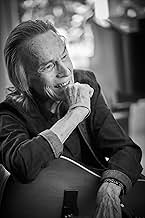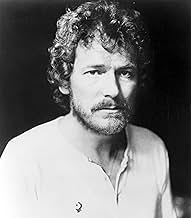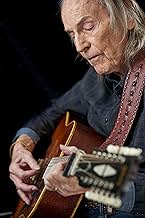The iconic Canadian musician, Gordon Lightfoot, reflects on his life and career.The iconic Canadian musician, Gordon Lightfoot, reflects on his life and career.The iconic Canadian musician, Gordon Lightfoot, reflects on his life and career.
- Directors
- Writers
- Stars
- Awards
- 5 nominations total
- Directors
- Writers
- All cast & crew
- Production, box office & more at IMDbPro
Featured reviews
Greetings again from the darkness. We realize very quickly that octogenarian Gordon Lightfoot isn't about to cater to co-documentarians Martha Kehoe and Joan Tosoni, or establish a new reputation as being a sweetheart at this stage of life. Instead he is filmed with his third wife Kim, watching clips of young Gord singing "(That's What You Get) For Loving Me". Despite his singing it with Johnny Cash, or having the song covered by Peter, Paul and Mary, Waylon Jennings, and many others, Lightfoot cringes and says. "I hate that song." That's what we get here - a man who speaks directly about his regrets, yet one who is appreciative of his life.
Lightfoot is thought of as Canadian Royalty, and is often referred to as the best ever Canadian singer-songwriter. He certainly played a key role in the popularity of folk music in the 1960's, and we hear about his influence from many important Canadian musicians, including: Geddy Lee, Sarah MacLachlan, Tom Cochrane, Ronnie Hawkins, Burton Cummings and Anne Murray. For some inexplicable reason, the filmmakers include an interview with actor Alec Baldwin, who is neither Canadian, nor a musician - though at least he does seem to be a fan of Gordon Lightfoot.
The profile skips over much of his personal life to focus on the music. In fact, initially it seems like Gord is going to walk us through his songbook, one by one. With "Early Morning Rain", we learn it was not only a hit for Lightfoot, but covered by others such as Judy Collins, Elvis Presley, Neil Young, and even Ian and Sylvia (a successful Canadian folk duo). It's also at this point when Burton Cummings explains that it was Lightfoot's songs that inspired The Guess Who to write their own songs. We also see a clip of a young Lightfoot being interviewed by an even younger DJ named Alex Trebek!
Anne Murray and Sarah MacLachlan discuss "Song for a Winter's Night", and Lightfoot explains how he isolates to write songs ...and he "waters" his guitars (something that makes more sense seeing than reading). Gordon tells the story of how he quit a promising career in banking to take a chance on performing, and he relates how growing up in the country helped him when he moved to the city. He also tells the fascinating "behind the scenes" story of how the record company changed the name of his first album after "If You Could Read My Mind" became a hit on the radio. By the way, that song has been recorded by a slew of artists - so many that the filmmakers offer up a slide show to make the point.
Photographs give us a taste of some of Lightfoot's infamous parties attended by various celebrities. It was this partying lifestyle that led to drugs and alcohol abuse, as well as his weight gain. Lightfoot talks about his 3 year affair/relationship with Cathy Evelyn Smith, a name you might recognize as the woman who injected John Belushi with the lethal "speedball" that killed him. It was his severe jealousy over Ms. Smith that led Lightfoot to write his biggest U.S. hit "Sundown." There is also an entire segment on Bob Dylan, and how much respect each of the songwriters had/have for each other.
Yet another "behind-the-scenes" moment occurs when one of Lightfoot's band members recollects the time they recorded "The Wreck of the Edmund Fitzgerald." They had never even rehearsed the song, and yet it was the first take in the studio that ended up being the hit version. Also included is a segment where Lightfoot reminisces about his childhood in Orillia, and we get a brief clip of his mom and dad. Even more shocking is the included recording of Lightfoot as a kid, singing with the church choir. The high pitched soprano voice bears little resemblance to the soothing tones of an older Gordon.
As a poet-singer-songwriter, few have been better or had more success than Gordon Lightfoot. The film skims over much of his personal life and his severe health issue in 2002, but focusing on the music is what his fans want - and it's a treasure trove of early performances, clips, and photographs. He's now 81 years old, and the filmmakers don't shy away from contrasting his singing voice on "If You Could Read My Mind" with a 'then and now' edit. Lightfoot admits to regrets, and also states "I appreciate having been alive." Still sporting that renowned attitude, he undoubtedly enjoys hearing Diana Krall and Sara MacLachlan open the film with the titular song. A Canadian national hero indeed. As a bonus, we southerners finally learn the meaning of "Gitche Gumee."
Lightfoot is thought of as Canadian Royalty, and is often referred to as the best ever Canadian singer-songwriter. He certainly played a key role in the popularity of folk music in the 1960's, and we hear about his influence from many important Canadian musicians, including: Geddy Lee, Sarah MacLachlan, Tom Cochrane, Ronnie Hawkins, Burton Cummings and Anne Murray. For some inexplicable reason, the filmmakers include an interview with actor Alec Baldwin, who is neither Canadian, nor a musician - though at least he does seem to be a fan of Gordon Lightfoot.
The profile skips over much of his personal life to focus on the music. In fact, initially it seems like Gord is going to walk us through his songbook, one by one. With "Early Morning Rain", we learn it was not only a hit for Lightfoot, but covered by others such as Judy Collins, Elvis Presley, Neil Young, and even Ian and Sylvia (a successful Canadian folk duo). It's also at this point when Burton Cummings explains that it was Lightfoot's songs that inspired The Guess Who to write their own songs. We also see a clip of a young Lightfoot being interviewed by an even younger DJ named Alex Trebek!
Anne Murray and Sarah MacLachlan discuss "Song for a Winter's Night", and Lightfoot explains how he isolates to write songs ...and he "waters" his guitars (something that makes more sense seeing than reading). Gordon tells the story of how he quit a promising career in banking to take a chance on performing, and he relates how growing up in the country helped him when he moved to the city. He also tells the fascinating "behind the scenes" story of how the record company changed the name of his first album after "If You Could Read My Mind" became a hit on the radio. By the way, that song has been recorded by a slew of artists - so many that the filmmakers offer up a slide show to make the point.
Photographs give us a taste of some of Lightfoot's infamous parties attended by various celebrities. It was this partying lifestyle that led to drugs and alcohol abuse, as well as his weight gain. Lightfoot talks about his 3 year affair/relationship with Cathy Evelyn Smith, a name you might recognize as the woman who injected John Belushi with the lethal "speedball" that killed him. It was his severe jealousy over Ms. Smith that led Lightfoot to write his biggest U.S. hit "Sundown." There is also an entire segment on Bob Dylan, and how much respect each of the songwriters had/have for each other.
Yet another "behind-the-scenes" moment occurs when one of Lightfoot's band members recollects the time they recorded "The Wreck of the Edmund Fitzgerald." They had never even rehearsed the song, and yet it was the first take in the studio that ended up being the hit version. Also included is a segment where Lightfoot reminisces about his childhood in Orillia, and we get a brief clip of his mom and dad. Even more shocking is the included recording of Lightfoot as a kid, singing with the church choir. The high pitched soprano voice bears little resemblance to the soothing tones of an older Gordon.
As a poet-singer-songwriter, few have been better or had more success than Gordon Lightfoot. The film skims over much of his personal life and his severe health issue in 2002, but focusing on the music is what his fans want - and it's a treasure trove of early performances, clips, and photographs. He's now 81 years old, and the filmmakers don't shy away from contrasting his singing voice on "If You Could Read My Mind" with a 'then and now' edit. Lightfoot admits to regrets, and also states "I appreciate having been alive." Still sporting that renowned attitude, he undoubtedly enjoys hearing Diana Krall and Sara MacLachlan open the film with the titular song. A Canadian national hero indeed. As a bonus, we southerners finally learn the meaning of "Gitche Gumee."
You know those Heritage Minutes about Canadian history? This felt like that but drawn out over a feature length documentary. Talking heads, over and over, about how Lightfoot was great. Yes, he was a great songwriter and musician. I think you can understand that by listening to a couple of his best songs. You don't need that over and over again from different people in a feature length documentary, though. It was cool to see Rush come in, and also Neil Young, but WHY was Alec Baldwin in this so much? He just seemed a bit random and out of place. Is he just a Lightfoot fan? OK, but that could have been explained somehow. Context is good.
Look, a great documentary should have some drama to it, some mystery, some narrative drive. This doc is more of a straightforward retelling of Lightfoot's career, song by song, and talking about the mechanics of the songwriting. This could be of interest to musicians, perhaps, but not most moviegoers. There isn't enough intrigue here.
Look, a great documentary should have some drama to it, some mystery, some narrative drive. This doc is more of a straightforward retelling of Lightfoot's career, song by song, and talking about the mechanics of the songwriting. This could be of interest to musicians, perhaps, but not most moviegoers. There isn't enough intrigue here.
Been listening to Gordon Lightfoot since I was kid. My mom bought us these old lunchbox sized radios and we could only get AM stations on 'em. The one that stood out was a canadian station that played Adult contemporary with a little folk mixed in. Those tunes are stuck in my mind to this day and Gordon Lightfoot was one of the artists I vividly remember. Everytime I hear one his classics I am instantly transported back to my childhood. Loved the documentary. Learned alot about Mr. Lightfoot that I had no idea about. Thought it ran a little long but there is much story there to tell. Thank you Gordon for your impressive life of art. A musician in the truest sense.
It's already been mentioned by someone else but I have to ask it again....WTF is with Alec Baldwin commenting on Gordon Lightfoot?
He's NOT a musician.....he's NOT a Canadian....and as far as it matters he's not a fan it seems...so why do we want to hear his comments about a Canadian musical legend ?
This documentary was done late in Lightfoot's life and what it lacks in vibrancy it makes up with a sort of honesty we don't usually see in public people until honesty can't cost them any fan-base.....such is the case here I suspect although he does seem to be the kind of person who does, and has always done it his way...with a few exceptions he talks about.
A bit about his childhood in Orillia and a bit about his early life as a musician learning both the trade and the politics behind the trade and he learned them both well.
Selections of his songs and several performances enhance this somewhat uninspired piece but if you're a fan of his, this is definitely going to please you.
Not long enough and not comprehensive enough and definitely not featuring enough fellow musicians...many of whom made huge hits with HIS words and emotions, it's still a good documentary and, all in all , a well spent time and a little bit learned about him that I didn't already know.
I discovered Gordon's music when living in Canada years ago. His music quickly became a big part of this Australian's education in all things "Canada". My love and appreciation for his work was only enhanced further by Gordon's amazing response to my question in a reddit AMA session in 2014. All this without me knowing (at the time) that my Mum had seen him in concert (1974) during his only ever Australian tour!
Needless to say, this was one of my most ever anticipated documentaries. It didn't disappoint. I found myself smiling throughout as the tales behind various Lightfoot songs were shared, and Gord took us on a journey into his world, complete with childhood in small town Orillia. I read Nicholas Jennings' Lightfoot a couple of years ago, and found this documentary made the perfect companion piece. It was great to see Jennings' contributions here too.
The archive footage was fantastic to see and really transported me back in time to 1960s and 70s Toronto. I smiled as I recognised various places from Gordon's work and places I had been myself.
This documentary is as much a tribute and appreciation to Gordon Lightfoot as it is actual piece about him. There are a lot of talking heads here (Bad Religion singer Greg Graffin was one of the most surprising and insightful) and many mentions of cover songs by other artists. I would have preferred more of Gordon himself and even more in-depth discussion of Gordon's work. Perhaps features a little too much of how he has influenced countless other artists, as opposed to focusing on Gord's impressive catalogue and life.
There are enough performances here to please any Gord fan. This documentary is distinctively Canadian, just like the man himself. There is a refreshing self-awareness portrayed by Gord when reflecting on his life and mistakes. I could have easily watched 5 hours of this - he has certainly had a career and life that is interesting enough to fill even more. Definitely recommend to all Gordon Lightfoot fans and anyone that identifies as a Canadian.
Now to go spin my Lightfoot records!
Needless to say, this was one of my most ever anticipated documentaries. It didn't disappoint. I found myself smiling throughout as the tales behind various Lightfoot songs were shared, and Gord took us on a journey into his world, complete with childhood in small town Orillia. I read Nicholas Jennings' Lightfoot a couple of years ago, and found this documentary made the perfect companion piece. It was great to see Jennings' contributions here too.
The archive footage was fantastic to see and really transported me back in time to 1960s and 70s Toronto. I smiled as I recognised various places from Gordon's work and places I had been myself.
This documentary is as much a tribute and appreciation to Gordon Lightfoot as it is actual piece about him. There are a lot of talking heads here (Bad Religion singer Greg Graffin was one of the most surprising and insightful) and many mentions of cover songs by other artists. I would have preferred more of Gordon himself and even more in-depth discussion of Gordon's work. Perhaps features a little too much of how he has influenced countless other artists, as opposed to focusing on Gord's impressive catalogue and life.
There are enough performances here to please any Gord fan. This documentary is distinctively Canadian, just like the man himself. There is a refreshing self-awareness portrayed by Gord when reflecting on his life and mistakes. I could have easily watched 5 hours of this - he has certainly had a career and life that is interesting enough to fill even more. Definitely recommend to all Gordon Lightfoot fans and anyone that identifies as a Canadian.
Now to go spin my Lightfoot records!
Did you know
- TriviaNumerous musicians are interviewed in the film to provide their thoughts on Gordon Lightfoot, those musicians including Sarah McLachlan, Geddy Lee (of Rush), Randy Bachman, Burton Cummings, Tom Cochrane, Anne Murray, Ian Tyson, Sylvia Tyson, Murray McLauchlan, and Greg Graffin (of Bad Religion). Archive footage of other musicians, such as Bob Dylan, talking about Lightfoot is also included.
- GoofsWhen Murray McLachlan is describing the apartment building in Toronto on Alexander Street, where Gord was living at the time, he said the apartment building was round like the old Decca Records building in L.A. The round building in L.A. is actually The Capitol Records building on Vine Street in Hollywood.
- ConnectionsReferences Harry Tracy: The Last of the Wild Bunch (1982)
- How long is Gordon Lightfoot: If You Could Read My Mind?Powered by Alexa
Details
- Release date
- Country of origin
- Language
- See more company credits at IMDbPro
- Runtime1 hour 31 minutes
- Color
- Aspect ratio
- 1.33 : 1
- 1.85 : 1
Contribute to this page
Suggest an edit or add missing content


































